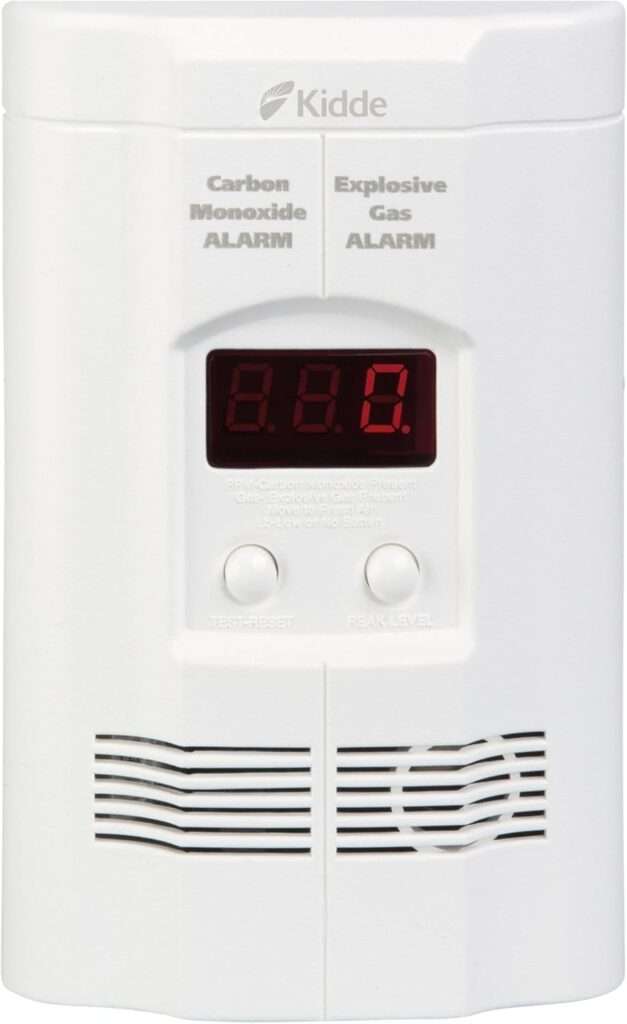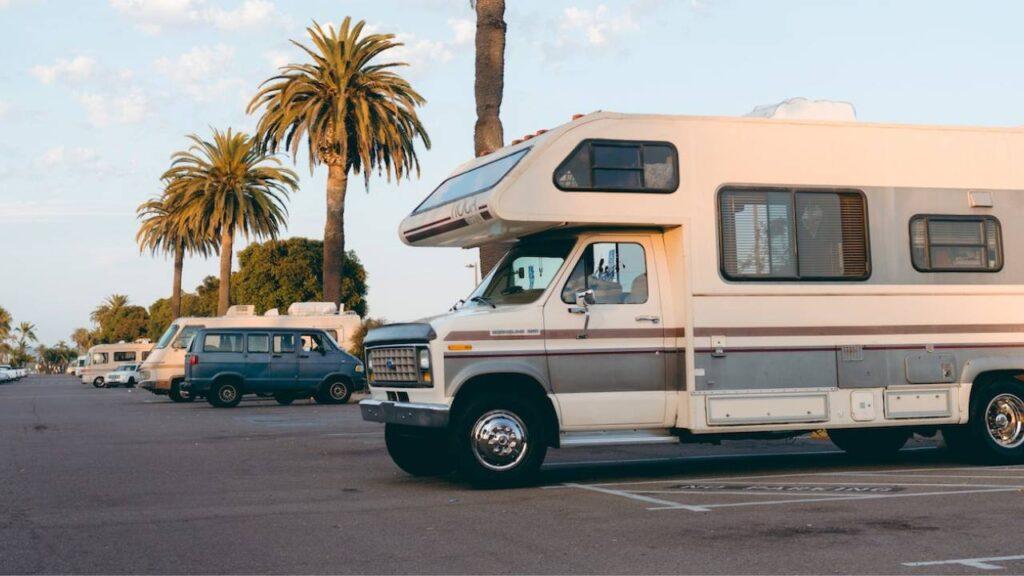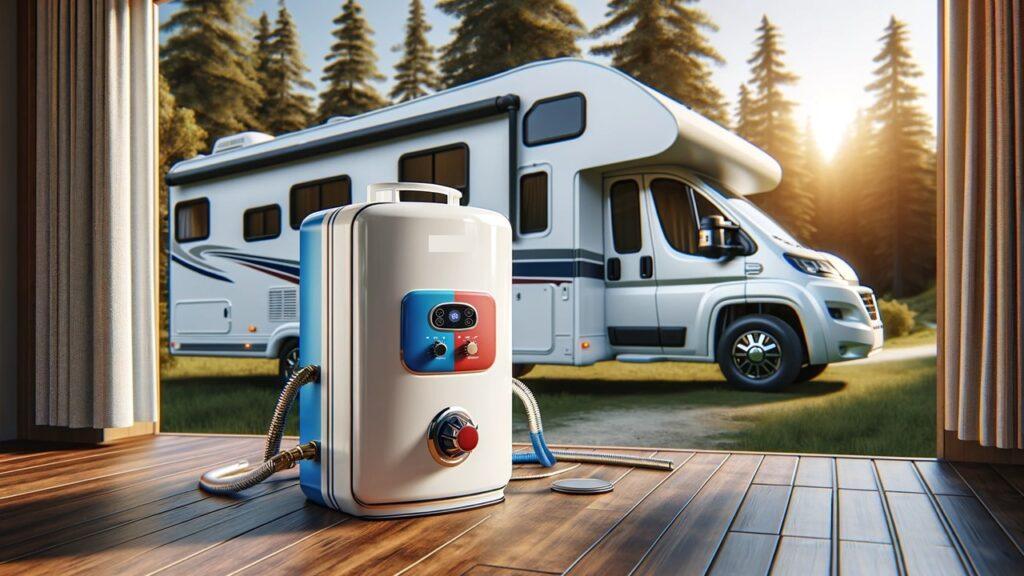The best RV carbon monoxide detectors protect you from leaks caused by propane appliances, furnaces, and generators. These small alarms detect carbon monoxide (CO) early and sound loud alerts—even while you sleep. We’ve reviewed 7 top-rated RV CO detector models with fast response times, long battery life, and bonus features like propane detection and backup power.
We’re reader-supported. When you buy through links on our site, we may earn an affiliate commission. As an Amazon Associate, we earn from qualifying purchases, at no extra cost to you.
Best RV Carbon Monoxide Detector: Our Top 7 Picks
- Best Overall Option: briidea RV Carbon Monoxide & Propane Gas Alarm
- Best with Propane and CO Detection: Kidde Carbon Monoxide Detector Propane Natural
- Best LED Display CO Detector: KH Carbon Monoxide Detectors
- Best Hardwired 12V Option: Tadeto RV Carbon Monoxide and Propane Gas Alarm
- Most Budget-Friendly CO Alarm: Kidde Carbon Monoxide Detector
- Best Plug-In Option: First Alert CO605 Plug-In Carbon Monoxide Detector
- Best Smart Dual CO and Smoke Alarm: X-Sense Smart Smoke Detector Carbon Monoxide Detector
1. Best Overall Option: briidea RV Carbon Monoxide & Propane Gas Alarm

Key Details:
- Dual gas detection: Carbon monoxide and propane
- Sensor type: UL-listed Japanese Figaro sensors
- Alarm volume: 100dB sound output
- Dimensions: 3 x 2 x 1 inches
- Indicator lights: Separate LEDs for CO and propane
- Power source: Propane-powered
The briidea RV Carbon Monoxide & Propane Gas Alarm is a reliable 2-in-1 solution designed to keep your RV safe from invisible threats. It uses Japanese Figaro sensors to detect both CO and propane, two gases commonly found in RV environments. What really sets it apart is the separate LED indicators for each gas, so you’ll instantly know what triggered the alert without second-guessing.
We found the alarm’s 100dB sound level more than capable of grabbing your attention—even if you’re outside the RV or deep in sleep. It’s compact enough to fit tight spaces and takes just a few minutes to install. The test and mute buttons are a nice touch, especially for regular maintenance checks or silencing false alarms during cooking.
That said, the unit is powered by propane only, which may not fit all setups—particularly those using 12V or battery systems. It also needs to be mounted between 4 and 20 inches above the floor, which can be restrictive depending on your RV layout.
Pros:
- Detects both CO and propane in one compact device
- Separate LED lights clearly show the gas type
- Loud 100dB alarm ensures you’re alerted
- Easy to install with helpful test and mute features
Cons:
- Only runs on propane power
- Mounting height requirement may limit placement options
2. Best with Propane and CO Detection: Kidde Carbon Monoxide Detector Propane Natural

Key Details:
- Multi-gas detection: Carbon monoxide, propane, methane, and explosive gases
- Sensor type: Electrochemical
- Alarm volume: 85dB
- Dimensions: 4”D x 4”W x 2”H
- Power source: Plug-in with 9V battery backup
- Special features: Digital LED display, Peak Level Memory, Smart-Hush button
The Kidde Carbon Monoxide Detector is a great pick for RV owners who want extra protection from multiple gas threats. It doesn’t just monitor carbon monoxide—it also detects propane, methane, and other flammable gases, which is ideal for RVs with gas appliances. Setup is straightforward: just plug it into a standard AC outlet, and you’re set. The 9V battery backup gives it added reliability in case shore power fails.
What we really like is the real-time digital display. It gives you accurate gas level readings that refresh every 15 seconds, so you always know what’s happening in your environment. You also get a memory function that logs the highest CO level detected, helping you stay informed about past exposures. The 85dB alarm is loud enough to alert you from another room, making it a strong line of defense without being overcomplicated.
The only thing to keep in mind is the alarm can be jarring, especially at night. Also, the 9V battery will need occasional replacement to keep the backup power working properly.
Pros:
- Detects CO, propane, methane, and other explosive gases
- Plug-in design with backup battery for continuous protection
- Digital display shows gas levels clearly and in real time
- Memory and hush functions add practical safety control
Cons:
- Alarm may be startling if triggered at night
- Backup battery needs periodic replacement
3. Best LED Display CO Detector: KH Carbon Monoxide Detectors

Key Details:
- Gas detection: Carbon monoxide
- Sensor type: Electrochemical
- Alarm trigger point: 150ppm CO
- Dimensions: 4.69”D x 2.05”W x 0.96”H
- Power source: AC plug-in
- Special features: LCD display, temperature & humidity sensor, sound and light alarm
The KH Carbon Monoxide Detector is a solid option if you want more than just CO detection in your RV. It also tracks indoor temperature and humidity, which gives you a better picture of your air quality. The LCD screen provides easy-to-read information, and it’s backlit for clear visibility, even in low light.
Its compact design makes it ideal for small spaces like RVs, trailers, or hotel rooms. Plug it into an AC outlet and it starts working right away—no mounting or setup needed. If CO levels spike past 150ppm, the unit sounds a clear alarm and flashes a light, so you won’t miss the warning. It’s a great plug-and-play device for anyone who wants added awareness inside their space.
One thing to note is that the alarm volume might feel intense during the night. Also, like most compact detectors, it has a 3-year sensor life, so you’ll eventually need to replace the unit for continued protection.
Pros:
- Tracks CO along with temperature and humidity
- Easy plug-in setup, no installation required
- Bright LCD display shows real-time readings
- Lightweight and portable for flexible use
Cons:
- Loud alarm may be disruptive at night
- Sensor needs replacement after about three years
4. Best Hardwired 12V Option: Tadeto RV Carbon Monoxide and Propane Gas Alarm

Key Details:
- Dual gas detection: Carbon monoxide and propane
- Sensor type: Electrochemical
- Alarm volume: 85dB
- Dimensions: 5.63″D x 1.21″W x 3.24″H
- Power source: 12V hardwired
- Special features: Light and sound alarm, real-time backlit display, installation kit included
The Tadeto RV Carbon Monoxide and Propane Gas Alarm is a strong choice for RV setups that rely on 12V hardwiring. This unit combines both CO and propane detection in one compact device, helping safeguard against two of the most common RV gas risks. It uses electrochemical sensors for quick and accurate alerts, offering peace of mind while traveling or parked at a site.
We found the real-time backlit display especially useful—it shows current gas levels clearly, even in dim lighting. That’s a big win when you’re checking on air quality at night or in low-light corners of your rig. It also comes with visual and audible alerts: the 85dB alarm and flashing lights are designed to be noticed fast, giving you time to react quickly in case of danger.
While it includes installation accessories for easy setup, the corded electric design means it needs to be near a 12V power source, which could limit placement in some layouts. It’s also a bit larger than other detectors, so you’ll need a bit of wall space to install it properly.
Pros:
- Dual gas detection covers both CO and propane
- Backlit display shows gas levels in real time
- Loud alarm and flashing lights ensure quick alerts
- Includes mounting hardware for flexible installation
Cons:
- Requires 12V wiring, limiting placement options
- Larger body may take up more wall space
5. Most Budget-Friendly CO Alarm: Kidde Carbon Monoxide Detector

Key Details:
- Gas detection: Carbon monoxide
- Sensor type: Electrochemical
- Alarm volume: 85dB
- Dimensions: 1.5″D x 4.5″W x 2.75″H
- Power source: Battery-powered
- Special features: LED indicators, Test/Reset button, Low battery alert, Event memory
The Kidde Battery Powered Carbon Monoxide Detector is a dependable, no-frills option for RVers who want portable CO protection at a wallet-friendly price. Since it’s battery-powered, it continues working even during power outages—ideal for off-grid camping or boondocking. Its compact size also makes it easy to place anywhere in your rig, from sleeping areas to the galley.
This model uses an electrochemical sensor to deliver accurate CO readings, and its LED indicators give you clear status updates at a glance. A green light confirms normal operation, while a flashing red LED, paired with an 85dB alarm, alerts you when CO levels become dangerous. The Test/Reset and Event Memory functions make regular maintenance simple and give added peace of mind after past events.
That said, the detector lacks a digital display, so you won’t see real-time CO levels. You’ll also need to replace batteries periodically, especially if you use it regularly or full-time in your RV.
Pros:
- Battery-powered for full-time protection during outages
- Small and portable—easy to move around the RV
- Loud alarm with clear LED status indicators
- Memory function tracks previous CO detection events
Cons:
- No digital display for live CO readings
- Batteries need occasional replacement
6. Best Plug-In Option: First Alert CO605 Plug-In Carbon Monoxide Detector

Key Details:
- Gas detection: Carbon monoxide
- Sensor type: Electrochemical
- Alarm volume: 85dB
- Dimensions: 1.38″D x 5″W x 3.4″H
- Power source: Plug-in with battery backup
- Special features: Test/silence button, end-of-life signal, continuous protection
The First Alert CO605 is a great plug-in choice for RVers looking for simple yet dependable CO protection. Its corded design eliminates battery hassle for daily use, while the backup battery keeps it running during power loss—a helpful feature when you’re parked somewhere without consistent electrical access.
Its electrochemical sensor is built for accuracy, delivering reliable detection without false alarms. The single test/silence button makes it easy to operate, even for first-timers. If CO levels rise, the 85-decibel alarm sounds immediately, giving you enough time to respond and ventilate the RV quickly.
The only thing to consider is placement—being plug-in only, it has to be near an outlet, which might limit your options inside smaller rigs. And unlike some advanced models, it doesn’t display live CO levels, which could be a downside if you prefer real-time readings.
Pros:
- Battery backup keeps the detector active during outages
- Accurate electrochemical sensor for consistent detection
- Simple one-button operation for testing and silencing
- Loud 85dB alarm ensures warnings are heard
Cons:
- Requires outlet access, limiting installation flexibility
- No digital readout for current CO levels
7. Best Smart Dual CO and Smoke Alarm: X-Sense Smart Smoke Detector Carbon Monoxide Detector

Key Details:
- Gas detection: Smoke and carbon monoxide
- Sensor type: Photoelectric and electrochemical
- Dimensions: 5.7 x 5.7 x 2 inches
- Power source: Battery-powered
- Special features: Wi-Fi enabled, app notifications, device sharing, 10-year lifespan
The X-Sense Smart Smoke and CO Detector is built for RV owners who want connected safety without sacrificing convenience. With its Wi-Fi capability, it sends real-time alerts to your phone using the X-Sense app—so you’ll know if something’s wrong, even if you’re not inside the RV. You get updates on alarm triggers, battery status, and any faults—at no extra subscription cost.
It features dual sensors for fast, accurate detection of both smoke and carbon monoxide. With a 10-year battery lifespan and the ability to share access with family, this detector creates a wider safety net, especially if you travel with others or store your RV offsite.
Just be aware that it relies entirely on Wi-Fi, so you’ll need a stable connection for alerts to work remotely. Also, the rounded design might not blend seamlessly with all RV interior styles or mounting locations.
Pros:
- Sends real-time alerts via free mobile app
- Long-lasting battery supports 10 years of use
- Dual sensors improve detection accuracy
- App-based device sharing keeps others informed
Cons:
- Needs consistent Wi-Fi for remote alerts
- Round design may not suit all RV layouts
Why You Need a Carbon Monoxide Detector in Your RV
A carbon monoxide detector warns RV occupants about deadly gas leaks from appliances, generators, and exhaust before symptoms appear.
In an RV, space is tight and ventilation is limited—especially when windows are shut during cold nights or while sleeping. That makes it easy for carbon monoxide (CO), an invisible and odorless gas, to build up without warning. A CO detector gives you real-time alerts, helping you act before things turn dangerous.
Because CO has no smell, taste, or color, you won’t notice it until it’s too late. And since many RVs rely on propane stoves, furnaces, and onboard generators, the risk is real. Whether you’re parked in the wild or connected at a campground, a working CO detector is one of the most important safety tools you can have onboard.
What Causes CO Leaks in RVs?
CO leaks in RVs happen when fuel-burning appliances fail, ventilation is blocked, or exhaust enters living areas.
Carbon monoxide is a byproduct of combustion. When things burn in a closed or poorly vented space, CO can accumulate quickly. Regular maintenance and smart placement of appliances can help reduce the risk.
Here are some common causes of CO leaks in RVs:
- Malfunctioning propane stoves or furnaces: Cracks, rust, or ignition problems can cause unburned gas to leak into the cabin.
- Exhaust from onboard generators: If the exhaust pipe is blocked, damaged, or directed toward a window, CO can seep inside.
- Running engines near vents: Parking or idling too close to your RV’s intake vents allows fumes to drift back in.
- Clogged or dirty vents: Vents from heaters or water heaters can backfill dangerous gases if they’re not clear.
- Portable gas heaters: Some aren’t made for enclosed spaces and lack the safeguards needed for RV use.
Dangers of CO Exposure in Small Spaces
Carbon monoxide exposure in an RV can lead to illness or death within minutes because the gas replaces oxygen in your bloodstream.
In a small, enclosed RV, CO doesn’t need much time to reach dangerous levels. Even a minor leak can be deadly if you’re asleep or unaware. Unlike larger homes, RVs don’t offer much air circulation, so the gas builds up fast.
Here’s why CO is especially dangerous in RVs:
- Fast accumulation: Small interiors allow CO to reach toxic levels much quicker.
- Oxygen starvation: CO binds to red blood cells better than oxygen, cutting off your air supply.
- Subtle symptoms: Early signs like headaches, nausea, and dizziness feel like motion sickness or fatigue.
- Nighttime danger: Most CO-related deaths in RVs happen while occupants are sleeping and unaware.
- Higher risk for kids and pets: Smaller bodies absorb CO faster, so effects show up sooner and more severely.
How to Choose the Best Carbon Monoxide Detector for Your RV
To choose the best carbon monoxide detector for your RV, consider your rig’s size, power source, sensor lifespan, and whether you need CO-only or combo gas detection.
Not all detectors work equally well in every RV setup. The right one should match your space, layout, and lifestyle—whether you’re boondocking off-grid or parked at a full hookup site.
It’s also important to choose a unit that’s specifically designed for mobile use, as RV environments come with unique vibration, temperature, and humidity challenges.
Let’s break down what to look for:
RV Size & Layout
Your RV’s size affects how many detectors you need and where to install them.
In a large Class A or fifth wheel, you may need multiple detectors to cover each sleeping area and kitchen zone. Smaller travel trailers or vans may get by with one unit, but placement matters.
Always install detectors near sleeping areas and appliances that use propane, but avoid areas where cooking fumes or fans might trigger false alarms.
Power Source: 12V vs Battery vs Dual-Powered
The detector’s power type should match your RV’s electrical setup and usage patterns.
- Battery-powered units are flexible and work during power loss, but require battery checks and replacements.
- 12V hardwired options are reliable for permanent setups, but they limit placement and depend on your RV’s electrical system.
- Dual-powered detectors combine both, offering backup protection in case of shore power or battery failure—ideal for full-time RVers or off-grid campers.
CO Only vs CO + Propane Combo Alarms
Combo detectors provide broader protection by detecting both carbon monoxide and propane leaks.
If your RV uses propane for cooking, heating, or hot water, a combo unit adds another layer of safety.
These detectors usually feature separate sensors and indicator lights, so you’ll know exactly what triggered the alert. For all-electric RVs, a CO-only model may be sufficient.
Sensor Lifespan & Maintenance
CO sensors have a limited lifespan, typically between 5 to 10 years, depending on the model.
Check the manufacturer’s label for expiration dates or end-of-life alerts. Some models have built-in memory functions to log detection history or flashing lights to show when it’s time to replace.
Regular testing (once a month) is key to staying protected. Look for units with a test/silence button for easy maintenance.
RV Approved
Always choose a detector that’s certified and rated for RV use.
RVs experience more motion, temperature swings, and humidity than homes. Look for products marked as “RV approved” or rated to meet UL 2034 and RVIA safety standards.
These are built to withstand road vibrations, electrical variation, and tight-space installation.
How Many Detectors Do You Need in an RV?
Most RVs should have at least one carbon monoxide detector near each sleeping area, with larger rigs often needing two or more.
Placement depends on your RV’s size, layout, and the type of appliances you use. If your RV has multiple slide-outs, separate rooms, or multiple propane appliances, you’ll want broader coverage. Don’t rely on just one alarm to cover the entire rig.
A good rule of thumb is one detector per zone: sleeping area, kitchen, and any extra enclosed spaces. For example, in a Class C motorhome, place one near the bedroom and another close to the kitchen or generator. If you have a toy hauler or garage area, consider adding a unit there too.
Also consider combining detectors—use CO-only units in one area and combo CO + propane units near propane-powered appliances. This layered approach ensures you’re covered from multiple threats, regardless of where you’re parked or how you travel.
How to Install a CO Detector in an RV
To install a carbon monoxide detector in an RV, mount it near sleeping areas and fuel-burning appliances, following the manufacturer’s height and placement guidelines.
Here’s how to install a CO detector in your RV:
- Choose a location near sleeping areas: This ensures you’ll hear the alarm if it goes off at night.
- Avoid installing near vents or fans: Air movement can disrupt sensor accuracy.
- Mount at recommended height: Follow the specific product’s instructions—most suggest 4 to 5 feet above the floor.
- Secure firmly to a flat wall surface: Use the included mounting screws or brackets.
- Test after installation: Use the test button to make sure the unit powers on and sounds properly.
- Label install date: Note the install date and set a reminder to check the unit monthly and replace when expired.
Note: Proper installation is key to making sure the detector works effectively. While CO is slightly lighter than air, it mixes evenly, so detectors can typically be placed at breathing height or mid-wall, depending on the model’s instructions. Always avoid installing detectors right next to cooking appliances or vents, which can trigger false alarms or limit accuracy.
CO Only vs CO + Propane Detectors – Which Is Better for RV Use?
For most RVs, a CO + propane detector offers better overall protection, especially if your rig uses propane-powered appliances.
Both types of detectors serve a purpose, but choosing the right one depends on your RV’s layout, equipment, and how you travel.
Let’s break it down to see what each one covers—and who it’s best suited for.
What a CO-Only Detector Covers
A CO-only detector monitors carbon monoxide levels from sources like generators, furnaces, and engine exhaust.
This type is best suited for:
- All-electric RVs with no propane systems
- Motorhomes where engine exhaust is the primary concern
- RVers who already use separate propane leak detectors
CO-only models are typically smaller, easier to install, and cost less than combo units.
What a CO + Propane Combo Detector Covers
Combo detectors detect both carbon monoxide and propane gas, giving you broader coverage with one device.
They’re ideal for:
- RVs that use propane for heating, cooking, or refrigeration
- Campers with onboard generators and multiple gas-powered appliances
- Travelers who prefer a simplified safety setup without multiple detectors
These detectors often feature separate indicator lights and alarm signals for each gas type.
Which One Should You Choose?
If your RV uses propane, go with a combo CO + propane detector. If not, a CO-only detector will usually suffice.
Combo units provide better peace of mind in mixed-fuel environments and reduce clutter by combining two functions in one.
For budget-conscious RVers or those with minimal equipment, a CO-only unit is still a safe, effective choice. Some RVers even install both types for added coverage in different zones.
Wrapping It Up!
Carbon monoxide detectors are essential for RV safety, helping you catch gas leaks early and prevent serious health risks.
Whether you’re using propane appliances, running a generator, or just spending nights off-grid, installing the right CO detector helps keep everyone inside safe. It’s one of the easiest and most effective ways to protect your health while on the road.
Start by choosing the type that fits your RV setup—CO-only or combo—then install it in the right place, test it regularly, and replace it when it expires. Taking a few minutes to do this can make the difference between a safe trip and a dangerous one.
At the end of the day, RV safety isn’t just about comfort—it’s about survival. Investing in a reliable CO detector is a small cost with potentially life-saving rewards.
Related FAQs
Do RVs need carbon monoxide detectors?
Yes, RVs need carbon monoxide detectors. RVs often use propane appliances, furnaces, and generators that can leak CO gas, which is colorless, odorless, and deadly. A CO detector provides early warning and helps protect you while sleeping or camping off-grid.
Can I use a home CO detector in my RV?
No, it’s not recommended to use a home CO detector in an RV. RV-rated detectors are built to handle mobile environments, variable temperatures, and vibration. Home models may give false readings or fail under RV-specific conditions.
How many CO detectors should I have in my RV?
You should install at least one CO detector per sleeping area in your RV. For larger RVs or those with slide-outs, multiple detectors are recommended to ensure full coverage.
Where should I place a carbon monoxide detector in an RV?
Install your RV carbon monoxide detector near sleeping areas and at head height. Avoid placing it too close to appliances or vents to reduce false alarms. Always follow the manufacturer’s placement guide for best results.
What’s the difference between battery-powered, 12V, and hardwired CO detectors?
Battery-powered CO detectors run independently, 12V models connect to your RV’s electrical system, and hardwired units often include both power and battery backup. Battery models are easy to install, while 12V and hardwired options are more permanent and reliable.
How long do RV carbon monoxide detectors last?
Most RV carbon monoxide detectors last 5 to 7 years. Check the manufacturer’s label for the expiration date, and replace the unit as recommended, even if it still powers on.
When should I replace my CO detector?
Replace your RV CO detector when it reaches the end of its lifespan, or if it chirps continuously despite new batteries. Expired sensors can’t reliably detect carbon monoxide.
Can CO detectors detect propane leaks too?
Only combination detectors can detect both CO and propane. Standard carbon monoxide detectors do not sense propane gas, so look for a dual-function alarm if you want coverage for both gases.
Why does my CO detector chirp even though there’s no carbon monoxide?
A chirping CO detector usually signals low battery, sensor failure, or expiration—not an active CO leak. Check the indicator light and battery level, and replace the unit if needed.
How do I test an RV carbon monoxide detector?
To test an RV CO detector, press and hold the test button until it sounds a loud alert. You should test your detector monthly. If it doesn’t beep, replace the batteries or the unit itself.

Jack Rivers is a long-time RVer, a husband, and a dad who’s traveled solo and now with his family. He’s learned a lot from years on the road, sometimes the hard way. From quiet mornings parked by the woods to messy evenings with the kids and a busted heater, he’s been through it all. Miles writes to share the real stuff, the small wins, and the lessons that make RV life worth it, no matter who you’re traveling with.







